There and Beowulf Again: Providence and Plot in Tolkien’s Hobbit
In the later days of Beowulf’s reign, a fiery dragon takes up residence on an abandoned inheritance of his people’s wealth. For three hundred years he had slept peacefully, until into his lair “went some nameless man, creeping in nigh to the pagan treasure; his hand seized a goblet deep, bright with gems. This the dragon did not after in silence bear, albeit he had been cheated in his sleep by thief’s cunning” (Beowulf, 77-79). Provoked to wrath by the theft, the dragon begins to terrorize the countryside. This plot may remind you of Bilbo’s deeds, and indeed Tolkien translated those lines from Beowulf in 1926, eleven years before the publication of The Hobbit. In fact, one year prior to his first novel, Tolkien published Beowulf: The Monsters and the Critics, a cornerstone study that changed the direction of scholarship on the poem forever. Clearly, when Tolkien wrote Bilbo’s story, his mind was filled with inspiration from the Old English epic.
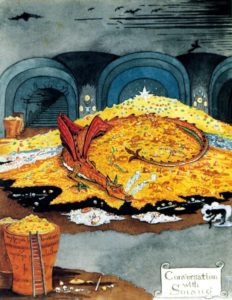
Smaug and his treasure as drawn by Tolkien. Source: Tolkien Gateway
The place of paganism in Christian speculative fiction
Tolkien shares with the Beowulf poet a peculiar status as a Christian writer who draws extensively from pagan sources. In some ways, Christianity is even more overt in Beowulf than in Tolkien: Grendel, the troll who terrorizes the Danes at the outset, begins his murderous rampage in fury over the bard’s song about God: “There was the sound of harp and the clear singing of the minstrel; there spake he that had knowledge to unfold from far-off days the first beginning of men, telling how the Almighty wrought the earth” (Beowulf, 15). This galls him because, as we learn, Grendel, like many other monsters, descends from the kin of Cain mixed, by implication, with the fallen angels, associating such creatures with the Nephilim (Beowulf, 16). The fiery dragon, overtly evocative of Satan, is even referred to as a “fiend” by the poet. So the poet explains pagan evils as enemies of the Christian God – as Tolkien put it in his essay, “At this point new Scripture and old tradition touched and ignited” (“Monsters and the Critics,” 11). Beowulf can overcome the ultimately human monstrosity of Grendel and his mother, but he cannot overcome the supernatural – Beowulf’s own prideful sin and the power of the devilish dragon are above the paygrade of his heroics.
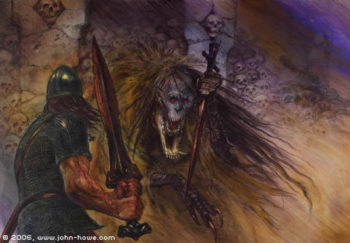
Beowulf battles Grendel’s mother. Source: Tolkien Gateway
A theme introduced early in Beowulf is that God brings heroes to the land for people’s aid. Hrothgar’s ancestor Scyld Scefing has an heir who is described as one “whom God sent for the comfort of the people” (Beowulf, 13). Tolkien translates this man’s name as “Beow” but in the manuscript it reads “Beowulf” – a common choice among translators of the poem to avoid confusion with the eponymous hero. So when the Beowulf says in the poem, “Ich eom Beowulf” (I am Beowulf), Hrothgar would remember (and so might the reader) that that name had been identified explicitly as the working of God’s providence. The Beowulf poet could find evidence that providence worked in pre-Christian times among Gentiles in Acts 17: 26-27: “And [God] hath made of one blood all nations of men for to dwell on all the face of the earth, and hath determined the times before appointed, and the bounds of their habitation; That they should seek the Lord, if haply they might feel after him, and find him, though he be not far from every one of us.” Of course, this does not mean that there is no distinction between the Christian believer and the pagan who felt after (intuitively sought after) God, but that perhaps something might be learned from the Anglo-Saxon poet’s pagan ancestors and their stories.
Though sin-stained and incapable of achieving the truths of special revelation without the direct intercession of the Holy Spirit (unique to Scripture alone), the faculty of imagination remains in pagans a component of the image of God that can glimpse, though through a glass darkly, enough truth for Paul to say that the non-believer is without excuse (Romans 1:20). Indeed, if gleams of God’s truth could be seen even in pagan myths, that would only serve to underscore God’s sovereign design of the human imagination, in spite of how sin causes specific uses of it to go awry. A story set in the pagan past of one’s ancestors might help the Anglo-Saxon Christian feel Gospel truths all the more poignantly precisely because illustrated by subject matter not intentionally crafted to support Christian belief until it came into the poet’s hands. This is true because pagan storytelling participates in a fundamental aspect of the Imago Dei: as Tolkien put it in On Fairy Stories, since God is a Creator, and Man is made in his image, we are therefore “sub-creators.” The difference between the pagan and the Christian storyteller is the latter ought to deliberately dedicate his writing to the service of Christian truth – however, not simply to believe the dogma of Christian truth but to understand the emotional and enchanting aspect of that truth, that which makes it compelling to the imagination as well as to reason.
Because the Beowulf poet begins his largely pagan narrative with Hrothgar’s court bard telling the story of God’s creative act, we can be sure that the poet had some consideration in mind of what it meant for a Christian to craft a story out of non-Christian material. This makes him, we might say, an early example of a Christian writer of speculative fiction, asking, “What can the tales of my pagan ancestors have to do with Jerusalem?” in story form. Tolkien, as a keen reader and admirer of the poem, found in Beowulf a paradigm for his own views of myth-making as a Christian. Explaining that “it was not consciously present to the mind in the process of writing” The Hobbit, Tolkien says nonetheless that “Beowulf is among my most valued sources” (Letters of J.R.R. Tolkien 31). The striking parallels of Beowulf’s dragon and Smaug’s provocation to rampage by an unimportant thief stealing a precious chalice are actually more interesting given that Tolkien says this was unintended, showing just how deeply the poem had worked its way into his imagination. And yet The Hobbit, as Tolkien’s mythopoeic creation, has even less explicit Christianity in it than appears in Beowulf. Biblical parallels, after all, become more explicit in The Silmarillion legendarium and The Lord of the Rings. It’s easy enough to see Christian parallels in Gandalf’s sacrifice that leads to glorification or the One Ring as the power of sin’s temptation (parallels, I say, not allegories, which Tolkien found unpleasant when too rigid). But what about The Hobbit?
Providence and the Image of God in Speculative Fiction
Tolkien spoke of Christianity as the true, historical fairy-story, where the refreshing experience of the fairy-tale’s happy ending becomes fact in the Primary World. It was not lost on Tolkien that Gospel meant “good news” or “God story”: “Man the story-teller would have to be redeemed in a manner consonant with his nature: by a moving story” (Letters, 100-101). Having contemplated how “Christian joy which produces tears because it is qualitatively so like sorrow” best moves the soul in story form, Tolkien’s stream of consciousness then moves to The Hobbit: “I had suddenly in a fairly strong measure the eucatastrophic emotion at Bilbo’s exclamation: ‘The Eagles! The Eagles are coming!’” (Hobbit, 101) Eucatastrophe, defined by Tolkien as the sudden and unexpected move towards the Good, was for him epitomized in sacred history by the Incarnation and Crucifixion of Christ: God’s historical fairy-tale where the joy of salvation, when deeply apprehended by the believing imagination, moves the Christian to tears.
Eucatastrophe is Tolkien’s literary retort to the maligned “deus ex machina,” seen by Aristotle and many of his followers as the ultimate black eye on narrative. But it is only so if one denies the metaphysical possibility of God moving providentially in His Creation – in this way, literary taste depends at least to some degree on worldview. The Eagles are Tolkien’s way of signaling that Eru Ilúvatar is showing his hand in Middle Earth – emissaries of Manwe the lord of the angelic Valar and Maiar from The Silmarillion, who is himself linked by Tolkien to Michael the Archangel and so a servant of God. Tolkien writes of the Valar, “These latter are as we should say angelic powers, whose function is to exercise delegated authority in their spheres” (Letters, 146). An example of Providence closer to Bilbo’s story, underscoring that teaching of Paul in Acts 17 that God is not far from us, is Gandalf himself, whom we know to be a Maia, one might say the Guardian Angel of Bilbo and the Dwarves. Speaking of such angels, Hebrews 1:14 reads, “Are they not all ministering spirits, sent forth to minister for them who shall be heirs of salvation?” Hebrews 1:7 associates angels with fire and wind, and Gandalf often uses fire as his primary weapon (as against the Goblins in the mountain passage) and his alliance with the Eagles makes him a being of wind too. Hebrews invokes angels to contrast their nature with that of Christ – indeed, to underscore his divinity. Since Gandalf is an angel, therefore, his pervasive presence inherently refers to the presence of another Being of higher glory.
But much of Bilbo’s success occurs when Gandalf is absent. Although an agent of Providence, Gandalf is not the whole of it. When Bilbo successfully brings the Dwarves out of captivity in the Wood-elven kingdom to Lake-town, the townsfolk “began to sing snatches of old songs concerning the return of the King under the Mountain” (Hobbit 182). This prophetic folklore involves the king overthrowing a dragon, so that The streams shall run in gladness The lakes shall shine and burn, All sorrow fail and sadness At the Mountain-king’s return! (182) The resonance with Revelation need not be explicated. Yet curiously “no songs had alluded to [Bilbo] even in the obscurest way” (183). Like the Gospel, the fulfillment of prophecy turns out to unfold in a surprising way in The Hobbit, not least of all where the Hobbit is concerned. “Will he do, do you think?” asks Gloin, remarking, “He looks more like a grocer than a burglar!” (18) The question echoes Nathanael’s: “Can any good thing come out of Nazareth?” (John 1:46) As Scripture oft repeats, in The Hobbit providence works through the lowly to embarrass the lofty. Gandalf reminds Bilbo of this, when he says, “Surely you don’t disbelieve the prophecies, because you had a hand in bringing them about yourself? You don’t really suppose, do you, that all your adventures and escapes were managed by mere luck, just for your sole benefit?” (The Hobbit 276)
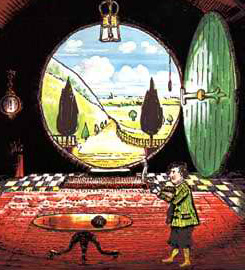
Bilbo Baggins as sketched by Tolkien. Source: Tolkien Gateway
The Beowulf poet too emphasizes God’s sovereignty in the wake of the final battle of his story, echoing Paul’s Mars Hill sermon: “God’s Doom was ever the master then of every man in deeds fulfilled, even as yet now it is” (Beowulf, 96). But Beowulf’s death in his confrontation with the dragon is a marked difference from Bilbo’s proverbial realization that he ought never laugh at live dragons: “He [Wiglaf] could not, dearly though he wished it, keep upon the earth his captain’s [Beowulf’s] life, nor any whit avert the Almighty’s will” (96). Where Beowulf is a negative exemplum of overweening pride in the face of spiritual warfare, Bilbo’s response to Gandalf bespeaks the humility a Christian should have when reminded that “you are only quite a little fellow in a wide world after all”: “Thank goodness!” (The Hobbit, 276)
One might say that the speculative question driving the fantasies of the Beowulf poet and Tolkien is: “What Christian truth can be seen by means of stories containing pagan subject matter?” How can stories be told without explicit Christianity in a way that helps us to better understand God and His relationship to Creation, and also Man’s image of God and its spiritual value found in sub-creation? But an adjacent question should be asked, one which some might argue Tolkien did not ask sufficiently: “How can meditation on pagan myth highlight the distinction between pagan falsehood and Christian truth?”
Tolkien’s Dwarves are famously named after the Dwarves of Norse mythology (their names directly taken from the Eddas), but although they prompt Bilbo to the journey, he also finds himself growing apart from them as he discovers humility. The Beowulf poet was right to see God’s providence even in his pagan past, and yet in doing so risked enshrining Beowulf’s unchristian pride and honor culture, a culture shared by the Dwarves (especially Thorin, who we are often told regarded himself as an “important Dwarf”). By making Bilbo (the thief) his hero rather than Bard (a far more Beowulfine figure), Tolkien reminds us of a fundamental Christian truth different from the more pagan model: we are not the hero of our story.
(Note that Anthony G. Cirilla is representing Bear Publications at the Realm Makers virtual conference, while Travis Perry is away for US Army Training…)


































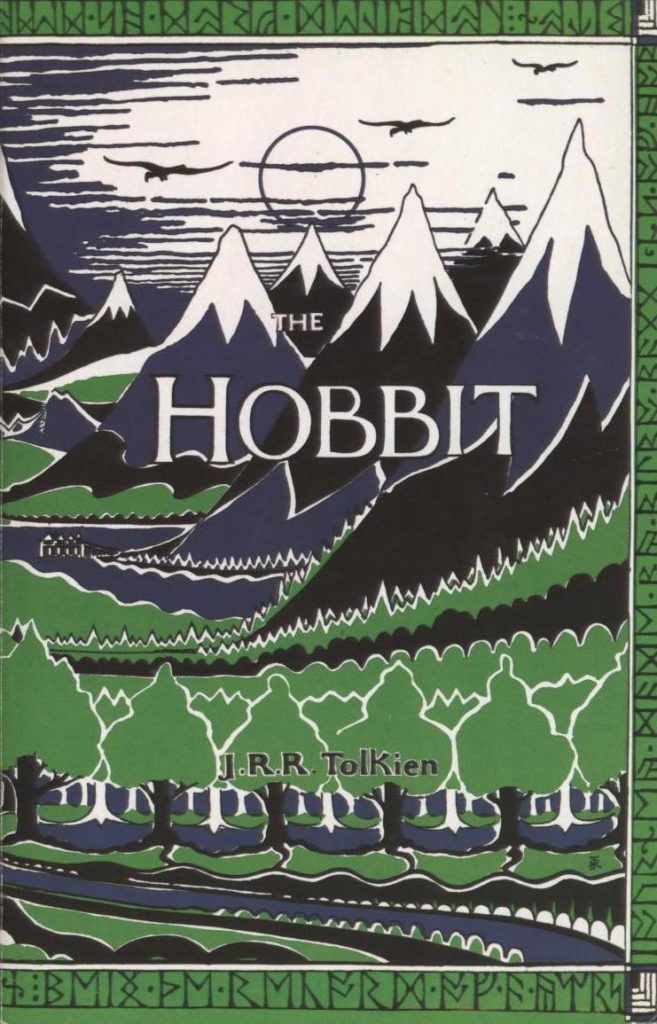

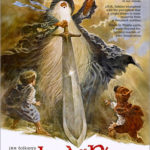
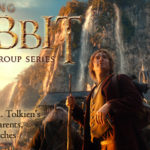





Thanks for this article!
Glad you liked it!
excellent!
Thanks!
?? The scribe of Beowulf was more than likely a compiler than an inventor. The Christian elements are later insertions. There’s more substance in the themes about humanity/inhumanity and how it relates to the hearth and hospitality customs.
But it would be interesting to consider whether a thief or a bard would be a better complement to a band of tanks and a wizard. Arguably a thief would bring a better balance to party dynamics, with a wizard already present for magic-based stuff.
My PhD was in medieval Literature and I’ve studied these arguments extensively (I translated Beowulf as an undergrad, and did some OE work as a grad student). While it’s true that the Beowulf poet got his material from previous iterations of the story, I think the compiler argument is untenable given the poet’s obvious skill (which shines through even when the scribe changes hands). And in any case even the act of compilation is an artistic one, and so we can read the choice of compilation as an artistic act with the Christian elements as part of that act.
I should also note, by the by, that the argument that the Christianity of the text is only grafted on is one which Tolkien is explicitly disagreeing with in his essay, “Beowulf: The Monsters and the Critics,” so even if the reading of the text is off base as far as it goes, it remains viable for interpreting Tolkien in that light, since we know he took its Christianity seriously.
I’m pretty sure I’ve read that Tolkien piece, but I have no memory of it.
If nothing else, this will get me to pull out my Norton anthology, even if only to prove some dude on the internet is wrong.
But the basis of the insertion theory is that the text can be removed without affecting the narrative, right? Grendel is inhuman more so because he violates the hearth-laws than because he’s descended from Cain or Jotun or whatevs.
Welp, it would be interesting to put you in a room with my prof with the same educational stats, but who is a pagan with tattoos. She did her own translation of Beowulf in grad school, too.
Oh yeah, disagreement exists among equally specialized readers of the poem – and not just on this issue. But given that we know what Tolkien thinks (which I quote above), at least it’s fair game to use that reading when thinking about its influence on his work, I’d say at a minimum. I think that stands even if one thinks of the Christian elements as superficially grafted on – which I don’t, but, hey, that’s alright!
Okay, I’ve gone back and read the introductory notes and then up until the part where Grendel got his arm ripped off (spoilers).
I stand by my assessment the Christian elements were grafted onto a pagan story, despite the fact that the compiler/poet/dude was a Christian. He was not the originator of the story, anymore than Shakespeare originated most of (or any) of his plays. I mean, this is a story about avenging your fallen comrades to satisfy your warrior honor, which is very much not ‘turn the other cheek.’
Nobody debates whether the story originated in pagan myth. I don’t see how that’s an objection to what I’ve written, when the point is that Tolkien sees the Beowulf poet as asking how the narrative relates to Christian understanding of monsters and Providence. For one thing, we know that the Beowulf poet knows more about the story than is centered: he knows the story of Beowulf swimming in the sea for example. The art of the Beowulf poet is in arrangement and choice for matter: the story pre-existing (which I am aware of and never disputed) is not the point of the argument, but that the Beowulf poet told it with Christianity in mind (which is indisputable).
Imagine if I made you a playlist of ten songs I didn’t write and wrote commentary about those songs. My commentary tells you how to interpret the sequence of songs, even though I didn’t write them, as far as my intended meaning. Yes, Tolkien knew that the Beowulf poet didn’t invent the fight with Grendel or the other two monsters. But he saw the Beowulf poet as telling the story the way he did to make clear a narrative pattern that is meaningful to his understanding of Christianity.
No one thinks the character of Beowulf or his adventures are inventions of Christianity. That’s exactly the question: why does a Christian think that story is worth retelling and connecting to the biblical story of Cain, and repeating statements about God (which occur late – my quote from Beowulf above is a good 2 thousand lines into the poem).
And as I’ll say again, the main question of the post is about how Tolkien’s reading of the poem influenced the Hobbit, even if one things his reading off. But it can’t just be about defending honor because Grendel, his mom, and the dragon are monsters. Monsters are creatures which reveal something about man’s struggle with more than social issues of honor, even though that is a major theme. I think it requires a flat reading of the poem to dismiss the philosophical implications of the narrative.
Also your point about Shakespeare actually serves to bolster my argument: that compilation and reconstitution of a previously existing narrative can have artistic meaning and merit. Just because Shakespeare sourced his story in Saxo Grammaticus doesn’t mean he isn’t thinking about differences between Protestantism and Catholicism when he brings up ghosts, purgatory, and problems of interpretation. The Beowulf poet didn’t invent Grendel, but he invented the connection between Cain and Grendel, and between the Nephilim and Cain’s Mom (the Giant sword at the bottom of the lake). The dragon too is connected with imagery connected to Satan, even if the dragon is obviously not his invention. Erasing the Beowulf poet’s intention to lead the audience to consider Christianity and paganism in the space of the poem just because he sourced his narrative in paganism just doesn’t make much sense to me.
*meant to say “his story of Hamlet” re Shakespeare above
I’ll say to the “if we took the Christianity out the plot would be the same” aspect: the problem is that, although there are pagan analogs, there is actually no other telling of Beowulf in existence. So neither side of the debate actually knows how a pagan would tell the story differently. Maybe it would be the same, but the chosen frame of Christianity would still matter because it tells us where the poet’s mind is artistically. If the story is conceived of as in a pagan past, then he can’t change the plot to include Jesus or something – he would logically have to tell the plot as if it were how it happened in the pagan past if the point of the story is to think about what Beowulf’s heroics mean for a Christian identity.
It’s also important not to import our modern (and often not universal) Christian notions of what it looks like to be a Christian to a culture that clearly saw Christianity differently than American suburbia does. We know well enough that honor culture didn’t stop mattering to the Anglo-Saxons when they became Christian, just as the admiration for warriors didn’t just disappear. If that were the case Arthurian Literature would never have developed. But as someone working essentially as part of the governmental structure, Beowulf’s duty was not to turn the other cheek but to stop a monster from eating his fellow men. Paul says that the government wields a sword to punish the wicked – Beowulf is acting as the emissary of two Kings when he slays the first two monsters and as a king himself when he slays the dragon. Christ’s statement about turning the other cheek hardly applies in this context or it would lead to a logical contradiction with Paul.
I actually addressed the distinction between Tolkien and the Beowulf poet on the subject of honor culture in the last paragraph of my original post, by the way.
And last point to make: we have to read the text as it’s actually written, and as it stands the text does make Christianity important to the plot. It’s not just that Grendel is said to be descended from kin of Cain, which is the poet’s explanation of monsters like him. It’s that he is motivated to attack Hrothgar’s people because he doesn’t like the bard singing about God creating the universe. His nature externally and his motivations internally are thus both linked to biblical explanations, and so, to speak in creative writing terms, his character arc is fully enveloped in Christian concepts. Speaking of turning the other cheek, by the way, a better example of that would actually be what the dragon fails to do: he ravages the country side because of one stolen cup when he still has a hoard. Hrothgar also warns Beowulf not to be prideful after defeating the trolls, which seems to undermine the idea that it’s purely an honor culture – or he would have told him to be super proud, not to modulate it with modesty before God.
Nulligravida FTW (aka Notleia) trolls Spec Faith comment sections as though it’s a semi-pro sport.
I actually don’t mind the discussion! Gives me a chance to think more carefully and helps me to piece together my thoughts more clearly.
Anthony my friend, you know that I asked you to take this slot for me and that though even you and I don’t always agree, I feel great respect for you and your scholarship.
But one element of what you said deserves a bit of criticism from my point of view. The view that Christianity teaches humility does not come from modern suburbia. It came from Jesus himself and the First Century.
Therefore, the fact the Christian poet retained honor culture in the story he told is a sign of a Christianity that is not fully Christian. And we have a historical and cultural reason to say that what actually happened in Europe was a hybridization of Christian ideas and Pagan antecedents. Certainly Europeans did not give up on warrior culture! Though they did change it.
Of course my concern is the modern hybridization of Paganism and Christianity, but I quite agree that Tolkien made a very important difference in the story by making the protagonist a small, humble figure. A much more Christian perspective–and I would not have thought of the story that way without your input. So thank you.
I wasn’t saying that humility comes from modern suburbia. What I was saying was that Beowulf’s warrior culture was part of his function as a member of the governing structure. It’s the difference between the proto-feudal system of the Anglo-Saxons versus ours now that gave rise to that phrase. Your own statement of what you see as valuable in my original piece shows that it’s clearly not the case that I was saying humility isn’t part of Christ’s teaching…
But I am glad that, despite our disagreement, our discussions have been interesting to you too, Travis, and thanks for the opportunity to participate on here.
I love discussions about Beowulf! Thank you for this. Studying the Anglo-Saxon culture during its time of transition between their pagan past and their embrace of Christianity is so fascinating. The early missionaries, the Irish monks, were happy to use aspects of Germanic culture and mythology, as well as the Celtic ones, to exemplify the Gospel. The ultimate warrior-king-hero, so exalted at that time, became associated with Jesus, of course, and his heroic self-sacrifice was a profound example and counter to the more self-aggrandizing heroes who were admired previously. Beowulf is a great example of this time of transition between pagan gods and Christ.
Agreed! Old English literature has always been one of my favorite periods specifically for this reason.
Really interesting read, further unpacking some ideas I discussed recently on Revelation TV. Fantasy is such a powerful vehicle for exploring Christian truth, and I’m fascinated to see the literary heritage of my own inspiration drawn from the Nephilim of Genesis 6.